Peter MALONE
Saturday, 18 September 2021 19:25
Summer to Remember, A
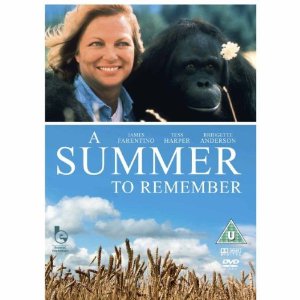
A SUMMER TO REMEMBER
US, 1985, 93 minutes, Colour.
James Farentino, Tess Harper, Louise Fletcher, Burt Young, Sean Justin Gerlis, Dennis Haysbert.
Directed by Robert Michael Lewis.
A Summer To Remember is a pleasant family about two children, one of them deaf, and their encounter with an orang-utan that escapes from a scientific laboratory. While the plot may seem far-fetched, it is handled quite nicely. The plausibility of the escape, the orang-utan travelling to Oregon, the encounter with the children, the orang-utan knowing sign language, the orang-utan being taken by a circus owner, the final escape with a gorilla. Needless to say, there is a happy resolution.
The film has a strong cast including James Farentino and Tess Harper as the parents, Louise Fletcher as the doctor, Burt Young as the circus manager - and a deaf boy, Sean Justin Gerlis, as the boy. The film will entertain a family audience.
1. Enjoyable family film? Animals? Children and animals? Science? Circuses? Decisions about animals?
2. The atmosphere of the American western states, the laboratories, the countryside, Oregon, homes, circus? Musical score?
3. The title and its importance for the children?
4. The plausibility of the plot: the training of the orang-utan to communicate in sign language, the car crash and the escape, the travel to Oregon, the children being able to hide the animal, the circus, the contact with the gorilla, the escape? The confrontation with Toby?
5. Dr. Dolly McKeever? and her training of the orang-utan, sign language and communication, intelligence? The car crash? Her wanting to get the orang-utan back, the co-operation of the police, the media? Her injuries? Discovering Casey? Handling the situation and the children? Friendship with the children?
6. Toby and Jill? At home, relationship with their mother, their stepfather, memories of their dead father? Tensions at home? Toby and his deafness? Unwillingness to communicate? The discovery of Casey? Their hiding her, in the tree-house, feeding her? Trying to persuade their parents? The strong insistence of the parents in telling the truth? Their happy excursions with Casey? The discovery of the truth? The circus? The harsh treatment by the manager? Their decision to let Casey go? Toby and the escape? Dr. McKeever? and the police? Chasing for Casey? The confrontation with Max? The rescue? Toby's reconciliation with his parents? The character of Casey - the personality of the orang-utan, the communication? The affection of the children?
7. The parents: their love for the children, concern, wanting them to tell the truth, not believing about the animal? The mother and her care? The stepfather and the strained relationship with Toby? His trying to take the place of the dead father? Promises, clashes? The reconciliations? The crises, the circus, the rescue and the chase? The final happiness - and Toby speaking?
8. The circus manager, his rough style, Max the gorilla, taking Casey, his harsh treatment, the escape? His assistant? Their being knocked around -comic style - by the gorilla?
9. The background of scientific research, animal experimentation, care of animals? Circuses and their treatment of animals? The human touch with the portrait of the family and the affection for the animals?
Published in Movie Reviews
Published in
Movie Reviews
Tagged under
Saturday, 18 September 2021 19:25
Sugar Cane Alley
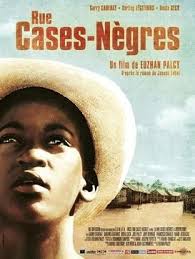
SUGAR CANE ALLEY
US, 1983, 103 minutes, Colour.
Directed by Euzhan Palcy.
Sugar Cane Alley is an interesting, enjoyable film. It is of interest as the first feature film from the West Indian island of Martinique. It is based on a novel, Black Shack Alley by Martinique writer Joseph Zobel. It has been written for the screen and directed by documentary film-maker (in her late 20s) Euzhan Palcy. The only professional actors in the film are the grandmother played by Darling Legitimus and the old man Medouze played by Senegalese actor Douta Seck. An excellent children’s cast is led by Garry Cadenat as Jose.
The film is set in the '30s and the excellent photography work and use of locations immerses the audience in the cane fields, the villages, the Fort de-France and way and style of life of the times.
The director has a sensitivity towards the characters and the situations in Martinique - and this is readily and agreeably communicated to the audience. An excellent example of Third World film-making.
1. An enjoyable film? Interest? Impact? Awards at the Venice Film Festival? A film from Martinique, the West Indies? A West Indies film industry?
2. The work of the director: a feminine viewpoint, young viewpoint, from Martinique, the history and the flavour of the people and of society, the issues? An adaptation of a novel, interpretation, sensitivity? Paris-trained director, the film and the influence of the French film industry? Documentary background? The skill of writing and directing?
3. The director's sensitivity: towards the island and its society, the atmosphere of the past, history, heritage, pride, oppression, racism, exploitation? A French- Colonial outpost? The repercussions on the people? Their African background? Slavery? The director's eye for detail, treatment of specifics, inviting the audience to feel with the people?
4. A novel from Martinique by an indigenous author, his experiences and sensitivity? The impact of the credits with the range of postcards: French outpost - yet Caribbean? The film as the equivalent of a visual letter sent to the world?
5. The titles - Sugar Cane Alley, Black Shack Alley (the title of the original novel and the French title of the film)? Themes? Treatment - sweetness or grimness?
6. The picture of Martinique in the 1930s: the village and the homes, the poor, neat and dignified homes and people, working and surviving? Joy and sorrow? Oppression? The adults and their labour, the children and their play, sense of community? The possibilities of education - or not? 20th century social changes, mechanism, wealth? The whites and the Martinique supervisors and their treatment of the workers? The native children, the mulattos? The city and wealth? The boats from village to city? The '30s cinema - with Dracula, The Jazz Singer etc.? Education and the future?
7. The cane fields and the hard work, the hours, the pay, the docking of the workers? The importance of the pay sequence with the adults waiting around, being given their handout, humiliated? The transition to the shopping - and the lack of money? Wives managing? Adults coping and not coping, drinking? The children and their play, as a group, the meal, ransacking Jose's house, breaking the pot, the raiding of the yard for the fruit and the egg, the buying of the rum, their getting drunk, setting fire to the house and garden? School? The children and their dealing with the adults? Having to be children and adult?
8. The portrait of the grandmother - a good and noble woman? her experience, her love for Jose, looking after him, working in the cane fields, her age and being tired, the neatness of her house, the discipline for Jose, her love for him? Not wanting Jose to work in the cane fields? His going to school? Her supplying his food? The trip to Fort de France and her dressing up, the interview, the poor scholarship? Her determination? Her illness? Moving to the city, doing the washing and ironing? Enjoying Jose's achievement? her return to the village, illness, dying? A strong woman? Bound by tradition - yet transcending it?
9. The character of Jose and the focus of the film: the young boy, his friends in the village, teaching Carmen to read, his intelligence, the influence of Medouze and his listening to him, understanding his heritage, the search for Medouze in death, his going to Africa (and his grandmother later going there)? The troubles with the other children, his being punished? School and his success? Mrs Leonce and her meals,- yet her using him for jobs and his breaking her plates? The discipline in the school? The examination and his success? Friendship with Leopold? The horse ride together - and the father's intervention and his being kicked? Leopold's running away? The city, the scholarship, the suit, his hard work, his being careful with his money, not having much to eat, the essay and his pleasure in its being read out, the teacher accusing him of cheating, his visit to Carmen and the tour of the house? The vindication by the teacher? The discussion with the girl selling the tickets in the theatre - and her wanting to be white, not to marry a white? His insight and comments on what it was to be black and to be white? His grandmother's illness and her death? Leopold being arrested and his calling out to him? The future and his possibilities?
10. The contrasts between the children - the girl and her leadership, friendship, not being able to go on after the exam, work in the Post Office, helping grandmother? Leopold and his friendship with Jose, his going home, his mother's wealth, the servants, his being brought up in a wealthy household, his father's attack, being kicked by the horse, his death and Leopold's hearing him not being acknowledged his son, running away, his going to the factory to look at the documents and take them, his being arrested? The other children and their wisdom and innocence?
11. The background of religion - Christian, the holy pictures, the priest and his acclaim of the white man and his bringing the statue from Lourdes? The men and their voodoo talk? The charms and the chants of the children?
12. The children and their ransacking the house, moving as a group, the pressures on them by their parents, the buying of the rum and the matches, the egg, their drinking and the effect, burning the house, punishment, work?
13. Carmen and his work on the boat, learning to write, attracted to the girls, his ambition to be an actor, working at the cinema, the tour of the house, his treatment by the lady of the house - imitating her yet the sexual use?
14. Leopold as mulatto, the house, his mother and father, the Josephine Baker records, his being disinherited?
15. Medouze and the wise man, present in the village, his story of Africa - and the vividness of its telling?
16. The portrait of a people?
Published in Movie Reviews
Published in
Movie Reviews
Tagged under
Saturday, 18 September 2021 19:25
Strongman, The
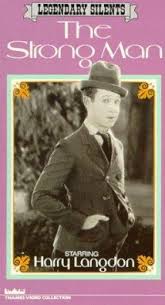
THE STRONGMAN
US, 1926, 75 minutes, Black and white.
Harry Langdon.
Directed by Frank Capra.
The Strongman is a Frank Capra silent film and a star vehicle for Harry Langdon. Langdon was a comic who resembled Charlie Chaplin in his stature as well as his comic style. Frank Capra was soon to move successfully into sound films, making a name for him at the beginning of the '30s but coming into his own with his Oscar-winning It Happened One Night and the succeeding optimistic social welfare films like Mr. Deeds Goes To Town, Mr. Smith Goes To Washington and It's A Wonderful Life.
1. Frank Capra and his career, his skill at being a gag-writer, directing sentiment and humour, indications of his future career? Harry Langdon as comic, presence, stature, style?
2. Silent film techniques, images, photography styles, black and white photography, editing and pace?
3. The opening with Paul and Zandow and World War One, the war in Belgium,, the irony of the picture of the war with the two holding their positions and being friendly with one another as well as firing at one another? Paul's injury? His being captured? The comfort of the letters from Mary Brown and America?
4. His capture, the end of the war, the voyage to the United States, the focus on Ellis Island, the arrival in New York and the possibilities? Zandow and his strongman act? Patil assisting him? The bonds between the two?
5. The long sequence with Paul in the street, the woman hiding the money, her attempts to get it back from him, comic timing and style, the image of the shy young man faced with the woman coming on to him? The long sequence for the film?
6. The trip to the border town, the picture of the nice old town, the contrast with its being dominated by vice? The comment on America in the '20s?
7. The situation, Zandow and his drunkenness? Paul having to go on in his stead? The gangsters in the town and their running the Palace Saloon? The religious demonstrations and Mr Brown? Mary and her blindness and-not having told Paul? The meeting of Paul and Mary, the pathos and the humour, his making her laugh, the discovery of the truth?
8. Paul and his comic performance, the response of the crowd, the cannon and its ultimately destroying the Palace? The demonstrators and their stances, procession, singing "Onward, Christian Soldiers"? Their being gratified by the destruction of the Palace?
9. Human comedy, sentiment, strong moralising? A comedy of the '20s?
Published in Movie Reviews
Published in
Movie Reviews
Tagged under
Saturday, 18 September 2021 19:25
Streets of L.A., The
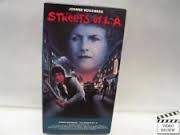
THE STREETS OF L.A.
US, 1979, 94 minutes, Colour.
Joanne Woodward, Robert Webber.
Directed by Jerrold Freedman.
The Streets of L.A. is an interesting telemovie focusing on the situation in Los Angeles, the racial mix- the differences in classes and opportunity. violence and justice. At times it seems as if it could go the way of the vigilante movies. However, the film opts for a sympathetic meeting between various hostile groups in the city.
The film is interesting as a star vehicle for Joanna Woodward. She portrays a divorcee whose tyres are slashed by some young Hispanic Americans. She decides to pursue justice and get the money. There are clashes, humiliations, angers. However, the film ends in understanding and reconciliation.
An interesting thriller - but interesting also in terms of an optimistic story about race relationships and hostility.
1. An interesting and entertaining telemovie? For the home audience? Americans? World audiences? The city streets and incidents of any large city?
2. The telemovie style, incidents and characters for home audiences, identifying, emotional response?
3. The importance of the focus on Los Angeles: the opening and the end with the aerial shots, the radio commentaries? The use of city locations? Homes? Neighbourhoods? Violent sequences, special effects and stunt work? Musical score?
4. Los Angeles as an American city: the environment, the people, the racial mix, classes, distribution of wealth, illegal immigrants and the law, police, job opportunities, housing, education, industry?
5. The portrait of Carol: a middle-aged woman, divorced, with a daughter? Living with her brother and antagonising him? her real estate job, the interviews with the Jewish lady about her property? Her relationship with Ralph, the possibility of a liaison? Her night with him, the meal, his sleeping? His being demanding on the job? The final clash with him? In herself, lacking in confidence? Angry? Her discovering the boys slashing her tyres, the chase? The visit to the police, tracking them down? Visit to the student's house, the interview with the parents, the parents making him pay? His further meetings with her? The other boy deported to Mexico? The seeking out of Ramon, the initial clash, anger, humiliation, his mother and her consideration? Ramon's stances, hosing her? His standover tactics about the role of the Latin American man? Macho attitudes? Her visit to the restaurant, covering for him? The second visit and the clash, his losing his job? Her growing determination? Discussion with her brother? The background of the deals with the Jewish lady, the lost opportunities, the friendship with the lady, her getting special rights? The clash with Ralph? The final confrontation with Ramon? His deceiving her, in the slum, her being chased and bashed? The vividness of her plight? Ramon rescuing her? The talking things over? The resolution? His giving her the money, her refusal, his insisting she take it? Their realisation that they were both angry? Her learning from Ramon's mother with the humiliation of the American dress-seller - better taking a stance that being spat upon? Interesting portrait of an average American woman?
6. The film's paralleling Ramon's experience with Carol? Ramon in himself, his home, his mother and the sewing, the bad deals and the dress-sellers trying to cheat? His friends? The background of his father coming to America and dead in the car trunk? His job, the money, frustrations? Illegal presence? His dream of buying the truck? His rage and the clashing of the tyres? Running away? The encounter with Carol, his-abusing her? Hosing her? Her going to him at the restaurant? His fears? His standover tactics with her? His friend telling him off? Leaving him? The victimising of Carol, rescuing her, talking things over? Hopes?
7. The student, the three and the slashing of the tyres? The drinking, the anger, the background of home life? The student and his parents' insistence that he pay? The--friendship with Ramon, Ramon'$ insulting his father, breaking with him?
8. Carol's brother and his work at home, impatience with Carol, the talk between the two and their support?
9. Ralph and his deals, sexual relationship, going to sleep, final clash with Carol?
10. The Jewish lady and her background, hooker? Her property, deals, Carol's visits and her work? Understanding and giving special rights to Carol?
11. The various groups in Los Angeles, their lifestyles, whites, Mexicans?
12. The Mexican stories, the administration of the law, the round-up of illegal immigrants? The hold of proprietors over the Mexicans?
13. The liberal views of the film, optimism? Themes of justice? Race? Opportunities and anger?
Published in Movie Reviews
Published in
Movie Reviews
Tagged under
Saturday, 18 September 2021 19:25
Stranger in My Bed
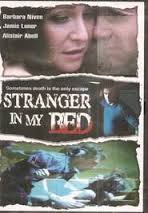
STRANGER IN MY BED
US, 1986, 96 minutes, Colour.
Lindsay Wagner, Armand Assante, Allyn Ann McLerie?.
Directed by Larry Elikann.
Stranger In My Bed is a somewhat suggestive title for what is, in fact, a rather serious telemovie about social issues and family. It is based on a true story and concerns a woman who is hit by a car, suffers amnesia and never recovers her memory. She has to get to know, once again, her family and her children. The film is presented in the serious and effective style of the American telemovie.
Lindsay Wagner is both attractive and persuasive in the central role. Armand Assante is her husband. The film is geared towards a wide television audience - but probes well the many problems that arise, given this bizarre situation.
1. Human interest? Audience identifying with characters and situations? The American telemovie style?
2. American backgrounds, family and home, school, hospitals, workplaces?
3. The film as a true story, audience reaction to its credibility, the characters, identification?
4. Lindsay Wagner as Beverley, the introduction to her at home with her husband and children, going out, the suddenness of the accident, her being hurt, the irrevocability of the effect? In hospital? The limits of medical help?
5. The situation, her reaction to the doctor, her not knowing Hank? Her losing all her memory and knowledge before the accident? Her bewilderment? The absence of information? Her awkwardness? Accepting that Hank was her husband? Her reaction in feat against the children? Thinking she would know had she had children? With her mother and father?
6. Her decision to trust Hank and go home? The awkwardness? Audiences sharing her tentativeness? The lists and the cards to help her in what she had to do? Her differing psychological condition? Buying new clothes? Meals? Her not going out, the venture at the party, her meeting the man and finding him attractive, the talk about Paris?
7. Frank and his ability to face the real situation? His hankering for the past? His looking at Beverley as she was? Saying the right things and trying to help her? At home, at work, details of family life? Sexuality and intimacy? The children and the boy's reaction against his mother, wanting his real mother? The daughter and her ability to cope? Ordinary things? Hank taking Bev to the new house? Her meeting the best man at the wedding?
8. The growing exasperation? Bev and her attraction towards the man from the party, going to his yacht, deciding to leave, the effect on her? Rank telling her of her father's death? The funeral? The effect of the death on her?
9. The children and their coping, her absence, the daughter taking advantage of her loss of memory?
10. The reconciliation? The confrontation with Hank and Bev trying to make him understand what he was doing to her? Give and take?
11. The final captions - and that Beverley and Hank had stayed together?
12. An informative look at the experience of amnesia? The psychological and social repercussions? A credible story?
Published in Movie Reviews
Published in
Movie Reviews
Tagged under
Saturday, 18 September 2021 19:25
Sous Le Sable/ Under the Sand
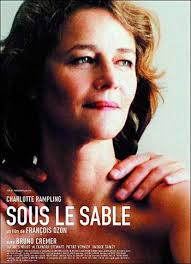
SOUS LE SABLE (UNDER THE SAND)
France, 2000, 105 minutes, Colour.
Charlotte Rampling, Alexandra Stewart.
Directed by Francois Ozon.
Under the Sand is a fine film. It is a portrait of a widow first of all unable to face the reality of her husband's death, using every kind of defence mechanism, imagining that he was still present. Ultimately, she has to accept her husband's death, listen to the advice of friends, begin new relationships, visit her husband's mother who has a vindictive attitude towards her, face the possibility that her husband was depressed and killed himself. When his body is found, she makes the effort to see is body and is then ready to continue her life.
Charlotte Rampling gives an excellent performance as the widow, finely controlled, full of dignity yet very vulnerable, especially in her defensiveness. Alexandra Stewart is her best friend, offering advice, trying to match-make.
The film is very simply and straightforwardly made. It was directed by Francois Ozon who began his career with such black films as Sitcom, Criminal Lovers, Water Dripping on Burning Rocks. With this film, he went up onto the A-list and his next films were Eight Women with an ensemble French cast led by Catherine Deneuve.
1. A portrait of a wife, widow? Charlotte Rampling's screen presence, dignity, vulnerability? The search for identity and meaning in her life?
2. The French settings, the apartment in the city, her friends' houses, gymnasium, restaurants? A comfortable and affluent environment? The coast, the holiday house? The action at sea in the search for the husband?
3. The title, the beach, secrets under the sand? The death of Jean? The musical score?
4. Jean and Marie, the long years of marriage, their careers? The dominance of Jean's mother? Marie unable to have children? Their comfortable life together? Questions as to whether he was depressed, bored? Suicide? Leaving Marie and starting a new life? An accident?
5. Their going on holidays, the normal preparation, the meal together? Going to the beach, her reading, his going for a swim? His disappearance, her initial lack of concern, her anxiety, the search, the authorities, the lifeguards and their attempts to find the body, the helicopters?
6. Marie and her return to Paris, dining with friends, chatter, the meeting with Vincent? Amanda and her husband and their support? Her talking as if Jean was alive? Her refusal to face the reality of his death?
7. Going about her ordinary life, at home, cooking, going to the gymnasium, meetings with Amanda?
8. Her imagining Jean in the house, communicating with him, talking, his approval and love? In the house, with Vincent, his approving her relationship?
9. The meeting with Vincent, Amanda and her matchmaking, their discussions in the kitchen? Vincent giving her a lift, the beginning of the affair? Her attitude, love, reserve? Passion yet still remembering Jean?
10. The time passing, her resuming her ordinary life, the financial advice but her still presuming that Jean was alive?
11. Communication from the authorities, the discussion about the body, the description of the body in gruesome detail, her wanting to see the body, completely? Going to the morgue, viewing the body?
12. Her final acceptance of Jean's death? The visit to the mother-in-law, her nasty attitude about having no family, knowing her son better than his wife knew him, his leaving her through boredom? Marie's comment that the old woman would end in an institution - and the woman retorting that Marie would go there first?
13. The reality of life, acceptance of death, having to make new decisions and start a new life? The author's perception of the psychology of a woman in this situation? Audiences being invited to empathise with her?
Published in Movie Reviews
Published in
Movie Reviews
Tagged under
Saturday, 18 September 2021 19:25
Song From the Heart
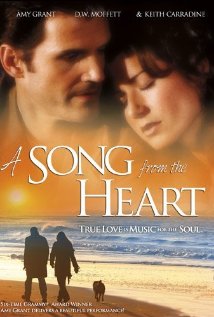
SONG FROM THE HEART
US, 1999, 95 minutes, Colour.
Amy Grant, D.W. Moffat, Keith Carradine.
Directed by Marcus Cole.
Song from the Heart is a star vehicle for Amy Grant, former gospel singer. She acquits herself well as a blind musician in this film - memories of Magnificent Obsession. She then has the opportunity to have a corneal graft and by the end of the film she is able to see again.
She portrays a woman injured in a car accident when she was eight, when her parents were killed. Reluctant to go in cars, trying to be self-sufficient, with a gift for teaching music to students, she is offered the opportunity to move out into a wider world. However, she finds her strength and her comfort in the widower neighbour, played by Keith Carradine, and his daughter. D.W. Moffat portrays the musician who clashes with her initially. When she saves his life and transforms his music, he is able to urge her to have the operation.
This is a film for tears, but the performances and the general "niceness" of the film give it more strength than might be expected.
1. A pleasing vehicle for Amy Grant fans? Entertaining for those who do not know her?
2. The city settings, the music school, homes, apartments, concert halls? The world of music?
3. The musical score, the performances of Mozart and other classics? The more contemporary music, the adaptation of the rhythms by Mary Anne, the performances by Gregory, by the school orchestra? The recording sequence? The final concert? The title and the entertaining music?
4. The prologue, Mary Anne and her parents, the gift of the chain, the joyful family, the tragedy of the crash? Her losing her sight? Her memories of this before the operation?
5. Mary Anne as an adult, her ability as a teacher, getting the orchestra to take its shoes off? Her ability to hear and to understand and know what was going on, the people around her and their moods and expressions? Teacher Tina the cello? Her own cello-playing? Her friendship with Oliver, best friends? The head of the school, the prospect of the recording with Gregory? His late arrival, her being put out, his reactions, careless attitude, her answers? Her antagonism towards him? Her changing the rhythms, his appreciation? With the limousine, her not wanting to get into the car, into the taxi? Her saving him from being hit by the bus? The response in his later saving her and giving her new sight? The performances, the rehearsals, getting to know him better? Being comfortable with him? Falling in love? The party, the dancing? Her friendship with Oliver? Gregory and his pressures about the operation, her finally conceding, overcoming her fears, going in the car, the recording the day before the operation, his promise that he would be there, not fulfilling it? The operation, the bandages coming off, her seeing Oliver? The performance, her telling Gregory the truth, her indebtedness to him, her inability to live his life on the road, visiting Europe? Her staying at home, her love for Tina, appreciation of Oliver, a future with the family? A rounded portrait of Mary Anne, her gifts, her tragedy with her sight, her new life?
6. Gregory, his migrant background, self-sacrificing parents, his achievement, fame, awards? His believing his own publicity? His relationship with his manager, her pushing him forward? The head of the record company, wanting him to find new life and zest? The head of the school, his late arrival, careless attitudes, criticism of the students? Having to start again with Mary Anne, her changing the rhythms, the rehearsals, shoes off? His attraction towards her, the limousine, the taxi, her not following up? His shrewdness in knowing that she was afraid of cars? Together, meals, shared experiences? Tina's birthday party? His persuading Mary Anne to have the operation? The concert tour, his missing the plane, meeting her after a month, the performance, composing music for her? His having to live with the separation?
7. Oliver and Tina, the background of Oliver's marriage, helping his wife in her cancer struggle, the truth about wanting a divorce? His love for his daughter, his work? Mary Anne's best friend, listening to her, supporting her? His daughter's party, the boy from school, dancing? The invitation to the recording? His inability to go? His love for Mary Anne, being there for the operation, when she opened her eyes? His discussions with his daughter? A future?
8. The students, their giftedness with music, the shoes-off rehearsals, the smart comments? The achievement for the recording? The final concert?
9. A popular kind of tearjerker, strengthened by the performances, Amy Grant's ability, Keith Carradine's quietness in the background? Sentiment - but avoiding too much sentimentality?
Published in Movie Reviews
Published in
Movie Reviews
Tagged under
Saturday, 18 September 2021 19:25
Speed Zone
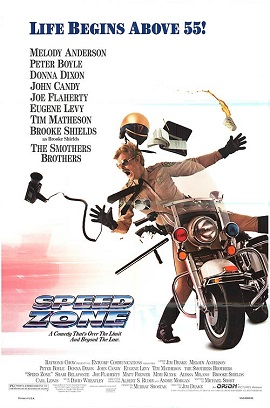
SPEED ZONE
US, 1989, 94 minutes, Colour.
John Candy, Tim Matheson, Eugene Levy, Shari Belafonte, Famie Farr, Carl Lewis, Brooke Shields, Art Hindle. Donna Dixon, Matt Frewer.
Directed by Jim Drake.
Speed Zone is another cut-rate version of the Cannonball Run. It has a hit-and-miss screenplay, introducing a range of characters and deciding to return to them spasmodically with no set purpose. There are a number of car sequences along the highway, some crashed. There is also a touch of humour.
The film would be a speed zero -if it did not have a rather impressive cast. John Candy probably saves the film with a genial performance. Tim Matheson appears as a TV reporter. Eugene Levy appears as a self-centred agent. Shari Belafonte is an attractive technologist. There are also guest appearances by Brooke Shields sending up herself, Carl Lewis running after a car, Jamie Farr reprising his role from Cannonball 2.
Only for those addicted to speeding car movies.
1. The American road, cars, the Cannonball Run?
2. The slapdash screenplay, slapdash characterisations, slapping characters in here and there, slapdash plot?
3. The Cannonball Run, its illegality, across the American states, the roads, the race, the police?
4. Peter Boyle as Edsel, his assistant? His madness, thinking he was General Patton? The meetings, the police forces, outside Baker City, the clashes, his own concussion, the mad ending? Send-up of authority?
5. The cars, the various types of cars, fast driving, pursuits, tricks, crashes?
6. The Cheap Jack plane taking off, becoming part of the race, the Smothers Brothers and their jokes, Brooke Shields? The plane losing its wings and entering the race?
7. The TV commentators and the send-up of their commentaries, their van, the decision to pursue, getting tough in Los Angeles after nearly crashing where there was no bridge, the woman taking over, falling in love?
8. The scientists, disguising themselves as hookers, getting the car, driving, their machinery, deciding to stay in Los Angeles?
9. Alec as the Terry-Thomas? caddish Englishman, Vie trying to kill him, the ambiguous scene in the toilet? In the race, taking apart the black man's car, the chase, the irony of Edsel in their car and winning? The black man arriving and the punch-up? The skit on the English, on gangsters? Vie going straight?
10. The policeman who joined up with the Italian mechanic, the drive going on to the semi-trailer, avoiding arrest by crossing the state line?
11. The portrait of Charlie, John Candy being genial, Leo and his hardness, the collapsing of the house? The jokes at Charlie's expense? Persuading him to drive, the attractive girl, their going together, the jokes, the driving, the lack of brakes, on the beach in Los Angeles, the confrontation with Leo, in love?
12. The Cheap Jack plain, Brooke Shields as the hostess, the Smothers Brothers and their jokes?, The Smothers Brothers going into the water at the end?
13. The end with the whole cast in dodgem cars, the sign of the slap-happy comedy?
Published in Movie Reviews
Published in
Movie Reviews
Tagged under
Saturday, 18 September 2021 19:25
Souvenir
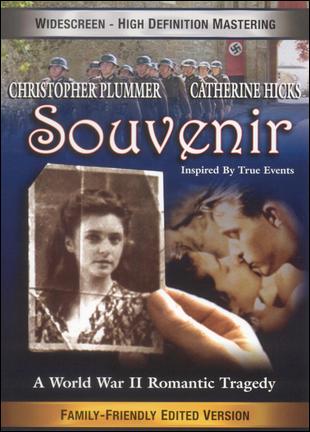
SOUVENIR
UK, 1989, 93 minutes, Colour.
Christopher Plummer, Catherine Hicks, Michel Lonsdale, Christopher Cazenove.
Director by Geoffrey Reeve.
Souvenir is a very good film based on the novel The Pork Butcher by David Hughes. It has been brought to the screen by producer-turned director Geoffrey Reeve, producer of some Alistair MacLean? adventures of the '70s, Puppet on a Chain, as well as British dramas The Shooting Party, The Whistle Blower.
The film was made in France and uses Paris and countryside locations very well indeed. It focuses on a German soldier who was 20 in the '40s returning to the place where he fought in World War Two. It has more memories than he realised. This brings about a tragic awareness and questions about reopening the scars of the war as well as the need for expiating guilt.
Christopher Plummer is excellent in the central role of the soldier. He gives a bravura performance. Catherine Hicks is persuasive as his daughter and Michel Lonsdale is the mayor of the village.
The film is quite moving, especially in its lyrical evocation of the affair in 1944 and in its emotional stress as hostages are rounded up in the town and put into a church which we know will be set on fire. The film has a great deal to say about human nature as well as the war.
1. The impact of the film as drama? Study of human nature? War? Its relevance to the '80s?
2. Credibility of characters and plot, the experience of war and the memories, the German and the French? Soldiers going to the United States and establishing a life after the war? The '80s and memories?
3. The title: remembrances of youth, the past, the fact of remembering? The regrets of not following things up? The relationship between Ernst and Jenny? His keeping her photo? Memorials and museums as souvenirs? The consequences of keeping the souvenirs, being devoted to them? Ernst's discovery of the truth and its place as a souvenir? The repercussions for his psyche? The psyche of allies and enemies reliving the war experience?
4. French locations, the '80s, Paris, the countryside, the village of Lascaud?
5. The portrait of Ernst, the pork butcher? His life in America, the taking over of his shop, selling up, the discussion about the money, travel? His decision to go to Paris? Audiences having to fill in the background of his life: wife and his not loving her, daughter? His arrival, the tension, Tina's apprehensiveness about him, going to the apartment, the dinner and Henri talking French? Taunting him? His hearing the couple fight?
6. The decision to travel, hiring the car, taking Tina with him"~ the bond between the two, talking and telling the story, beginning to share the past, in the shop, Tina finding the photo, talking about it at the picnic? The intercutting of the memoir? At twenty years of age, in the army, in occupied France, the attraction towards Jenny, his understanding of her background, truly in love with her for more than forty years, her work at the cafe, in the bushes, the children passing, the sexual encounter, intercut with the dancing, Charles Trenet and the American song?
7. His arrival in the '80s, the bond between father and daughter, the celebrations of the Fourth of July and the significance for France, the mayor and his ambitions,-hopes for a united Europe? Processions and speeches? The encounter with William Root, the discussion with him, his pressurising them? Wandering the town, seeing the plaque, discovering the fate of the women and children, looking for the place where the men were shot, going into the church, sitting there contemplating? His memories of the resistance, the massacre of the,-two officers? The rounding up of the men, of the women and children? His grief at the realisation of what had happened? His place in the round-up?
8. The grief, going to the hall, seeing the children dancing as they did forty years earlier? Wanting to speak, being overwhelmed? Tina and William and their concern? His going to the mayor's house, accusing himself of guilt, the need to confess, the truth about his locking the door, going away and not knowing what happened? Guilt, Motion, needing to purge himself?
9. The mayor and his place in the town, the discussions with William Root, the publicity? His wife and her devotion? His interest in meeting Ernst? His philosophy about a United Europe? Forgetting the war? His telling Ernst the truth about his place in the Resistance, his killing the officers, his discovery of what had happened in the burning church, his responsibility for the hostages, setting up the memorial? His political views? Taking down the plaque? Change of heart?
10. The theme of remembering or forgetting? The population of the town born after the war? The passion of the war, time healing old scars, opening them up, guilt, judgment? The importance of the curator of the museum, his absence at the roll-call and not dying? His taking people round the museum, dedicating forty years of his life? His overhearing the mayor's speech? The decision to kill him?
11. Tina, her relationship with her parents, disliking her father, his not expressing emotion to her? Not loving her husband, their clashes? Travelling with her father, curious, her various moods? Her antagonism towards Root? Tired, his helping her, puzzled about her father, blaming him? Helping him in his anguish? The reconciliation? The night with William and her future? Watching her father killed, the look of reconciliation and peace?
12. Root as an international journalist, covering up, his enquiry, manipulation, of the mayor, of Tina and Ernst, helping Tina, arranging the meeting, present at his death? A future with Tina?
13. The importance of the life journey, the memories? Healing of memories?
14. The lyrical sequences of the '40s? The realities of war in the occupied town? The brutality of the killing? The tension of the round up of people from their ordinary way of life, the build-up to the separation of the men, the reaction of the people, their all filing into the church? The audience knowing what was to happen to them?
15. Ernst's death, saving the mayor, a hope for a united Europe? His own expiation?
Published in Movie Reviews
Published in
Movie Reviews
Tagged under
Saturday, 18 September 2021 19:25
Soursweet
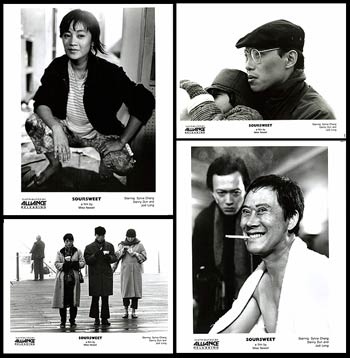
SOURSWEET
UK, 1988, 110 minutes, Colour.
Sylvia Chang, Danny Dun, Jim Carter, Craig Fairbrass.
Directed by Mike Newell.
Soursweet is based on a celebrated novel by Timothy Ho. It shows an ethnic group trying to cope with life in London. While there have been several films on Pakistanis and West Indians in London (My Beautiful Laundrette, Sammy and Rosie Get Laid), there have been very few focusing on the Chinese from Hong Kong.
The film was directed by Mike Newell (Bad Blood, Dance With a Stranger, Amazing Chuck and Grace, The Good Father). It has a strong Chinese cast and they bring the characters quite vividly to life. However, there is almost too much material for the film - and the screenplay rushes very quickly from one scene to another, not enabling the audience to establish a rapport with the characters and an understanding of them. With these limitations, the film is interesting, portrays aspects of human nature and prejudice, highlights the life of the Hong Kong Chinese in Mrs Thatcher's Britain.
1. The focus on Hong Kong, the Chinese, Britain of the '80s? Ethnic groups? Prejudice? Adaptation?
2. The Hong Kong and British locations? The feel of London? Musical score and atmosphere?
3. The title, the reference to Chinese food, Chinese restaurants? The bittersweet story?
4. Audience interest in the characters and situation? Response to characters, race difficulties? Britain, social issues? Relationships? The Chinese gangs? The soursweet tone? The Hong Kong settings, the build-up to the wedding, the bride and her girlfriends, the boys, coming to see the bride? The parents, the ceremony? Enjoyment? The question of British citizenship? The transition to England?
5. The portrait of Chen: his age, marrying Lilli? Their little boy? Establishing their home, the house? Work, Chinese food, restaurants? The waiters? The gang bosses? Chen's father, the gambling, the debts? His being trapped? The pressure with the gangs, the members, the waiters? Carrying drugs? His silence and not telling Lilli? The arguing with her? Yet his love for her, his passivity? The decision to move?
6. Lilli, the young Hong Kong girl, the marriage, her son? Love for Chen? Lively and aggressive? Her life in England, hopes, wants? The tensions? Wanting the business? The relationship with her sister, at the wedding, in England, love and clashes?
7. The possibility of opening the business, Chen and the family leaving, disappearing? The new location, Con and his garage, the discussions and negotiations? Building the restaurant up, the opening, Lilli waiting, Con and his agreement, the phone, the customers? Lilli and her stern attitudes towards English youth? The sister and the Belgian truckie? Her relationships, pregnancy, trying to hide it, the shame? The build-up of their life in the restaurant, Chen and his work, hiding from the gangs?
8. The son, at home, his English accent, going to school, the pressure from his mother, the fights, self-defence, injuries, his mother training him in martial arts, her concern about studies at school and playing? The effect of his education, becoming British?
9. Chen and his life, the passing of time,-success. quiet, evading the difficulties, not talking with Lilli about the problems?. Lilli and her push?
10. The sister, her pregnancy, the question of adoption, the birth of the child, Chen and Lilli and their support, marrying? Getting the child back?
11. The world of the gangs, the suave bosses, the henchmen and their violence, tough, their talk, the physical attacks on the restaurants, the drug peddling, the lies and victimising people, the power struggles, the wounding of the henchman, getting him out of power? Chen being targeted as victim?
12. The confrontation, the dangers, the plans, Chen as victim, the lies? His disappearance and death? The money being sent to Lilli?
13. Lilli abandoned by Chen, receiving the money, hoping against hope? Her future with her son? Her sister?
14. The drama and the melodrama? How well combined? The episodic nature of the film? Strong characters? Credible situations?
Published in Movie Reviews
Published in
Movie Reviews
Tagged under